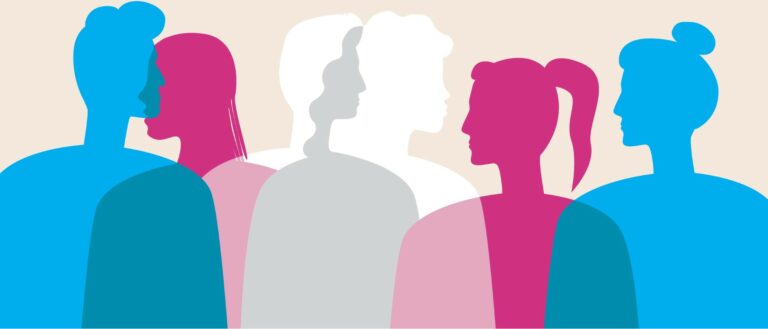Understanding Gender Dysphoria When You’re Dating Someone Trans

There are several terms you may have heard when dating transgender people and others from the LGBTQ+ community. One of those terms that we are talking about in this article is gender dysphoria. It’s something that mainly affects trans people, although not all trans people experience dysphoria.
It can commonly be confused with another term called body dysmorphia, but they are two different things. From WebMD, body dysmorphic disorder is defined as, “a distinct mental disorder in which a person is preoccupied with an imagined physical defect or a minor defect that others often cannot see”.
Some examples of things that someone with body dysmorphia may look at about themselves is their weight or shape of their body. Although a trans person may also experience body dysmorphia, it’s a separate experience from gender dysphoria.

Table of contents [ Show Hide ]
- What is gender dysphoria?
- What causes it?
- What you should say to someone that opens up about their dysphoria
- Can you help?
- Are you able to understand gender dysphoria?
- Dating someone with gender dysphoria
- Our recommendation for transgender dating sites and apps
- How to be a good ally to a trans person you love
What is gender dysphoria?
We discussed what body dysmorphia was, but what is gender dysphoria? From the American Psychiatric Association, it’s defined as, “clinically significant distress or impairment related to a strong desire to be of another gender, which may include desire to change primary and/or secondary sex characteristics.”
To explain in more simple terms, gender dysphoria can present itself as being uncomfortable with certain body parts that are generally labelled as male or female. As an example, a trans man may experience dysphoria from having breasts or the lack of male parts. A trans woman, on the other hand, may experience dysphoria from not having breasts and the lack of female parts.
A non-binary person can experience dysphoria differently. They may have different feelings about their body, or not experience dysphoria at all. Some transgender people don’t experience gender dysphoria, but they are still valid.
What causes it?
As the NHS website states, there is currently no known cause of gender dysphoria as the study of gender development is complex and is still being studied. However, the one thing that is clear is that gender dysphoria isn’t related to sexual orientation. Gender identity and gender expression are separate from sexuality.
Even though we still don’t know the direct cause of gender dysphoria, it shouldn’t be compared to other mental health conditions such as bipolar disorder or schizophrenia. Gender dysphoria somehow originates from the brain, but there is evidence of trans people being born the way they are. It’s not a choice to be transgender, but the answer on where it originates is still being studied.
What you should say to someone that opens up about their dysphoria
If someone decides to open up to you about their experience with gender dysphoria, it means that the person must trust you a lot as it can be an extremely personal topic. It can also be a scary topic to talk about, especially if that person is about to start or is currently transitioning.

With that in mind, what are some things that you can say to a trans person if you want to express your support for them? Below, we will provide some examples of what you can say.
- Thank them: One of the first things you should do is thank them for being open with you and recognize that it must be a difficult feeling to experience. You may say something like, “Thank you for being so open with me, I know it must be a difficult thing to go through.”
- Ask/confirm pronouns: If you’re not sure and the trans person hasn’t told you yet, ask them what pronouns they feel most comfortable using. Pronouns are part of everyone’s identity whether or not you are trans, so it’s important to check what they are. It can be a simple question such as, “What pronouns do you use?”
- Ask if there is anything you should know or do: This is good to bring up, as it lets the trans person know that you are a safe person to talk to, and that you are taking their experience seriously. An example of what to say may be, “Is there anything else you would like me to know? What can I do to help you feel more comfortable?”
- Tell them you are there for them: It’s important for a trans or non-binary person to feel safe with the people they surround themselves with, so it’s also important to let them know that you support them and can help as best you can to make them feel comfortable around you. You can say something such as, “I will always be here to support you if you need it.”
Dating someone with gender dysphoria and you’re about to get intimate? We’re sure you want to do everything right. Check out our tips for your first time with someone trans.
Can you help?
It’s amazing that you would like to help the trans person in your life. Most of what you can do is offering support if they need it and being careful to respect pronouns as well as other boundaries that they may have.
For example, it can be possible that the person you’re dating wants to stay in the closet in front of their family, friends or co-workers. In that case, try to respect this decision, even if it’s hard and give them the space to find the right time for their coming out.
If the trans person is seeking monetary support for hormone therapy or medical procedures such as sex reassignment surgery, it would be nice if you are interested in donating to their fund, but it’s not expected at all. It’s extremely appreciated to receive support for a large procedure such as surgery, but no one expects donations.
Other ways you can help if the trans or non-binary person is getting surgery is offering to bring them food or do errands for them to help with their daily needs while they heal, but once again it is not a requirement nor expected of you.
Are you able to understand gender dysphoria?
Although gender dysphoria can be explained as good as possible, it can be difficult or even impossible for a cisgender person to completely understand it. Because gender dysphoria is from wanting to change primary sex characteristics, cisgender people normally don’t experience that because they are comfortable with their gender identity.
Relationships between two transgender persons can be easier in this regard. Although, not every individual’s experience with gender dysphoria is the same.
An analogy provided by Pink News about what gender dysphoria feels like is described as;
“Gender is a lot like a pair of shoes. If you have on a good, comfortable, well fitting pair, you don’t notice it or think about it. As you walk around you aren’t constantly thinking about your shoes and the comfort, it’s just there and fine and normal and it doesn’t concern you one single bit. It’s almost hard to notice because if they feel fine it seems to silly and unimportant to spend energy thinking about it.”
“But if your shoes are too small and tight or there is a rock in them it’s all you can think about. Every step is annoying and miserable and you don’t want to do anything else until you fix this damned rock. Doing anything else seems crazy until your shoes stop hurting you.”
It’s far more common for a cisgender person to experience body dysmorphia — the feeling of viewing features of your body differently — but it’s unlikely they will completely understand how it feels to be uncomfortable with their biological sex.

Dating someone with gender dysphoria
If you’re dating someone that is trans, non-binary, or genderqueer, it’s extremely likely that they experience gender dysphoria. The feeling can come and go, and happen frequently or not so often.
As we already mentioned, the most important part is to support the trans person in your life as best you can. Depending on where they are in their transitioning journey, it can be a nice gesture to gift them items such as a binder, makeup, or clothing depending on their gender identity.
When someone is beginning their transition, it can be expensive at first if they are looking to replace their wardrobe and other items that they have. It can be a great help and a good gift idea if you choose to help them with their journey.
Other than support, it’s important to avoid making microaggressions against them. From Oxford Languages, microaggressions are defined as, “Indirect, subtle, or unintentional discrimination against members of a marginalized group.”
Some examples of microaggressions as shown on the GLAAD site that have been said to trans people include, “You are so beautiful for a trans girl!” and “Did you have THE surgery?”
Those examples demonstrate the ignorance that has been spread around by cisgender people and are actually offensive statements to trans and non-binary people. No one, especially trans people owe any level of gender binary to anyone else. Also, questions about surgery or body parts without being given permission to talk about it is a personal topic that shouldn’t be prodded.
Our recommendation for transgender dating sites and apps
Here are our latest recommendations and top picks for the best transgender dating sites and apps:
- Large database of verified & attractive Asian and European singles
- Efficient communication and instant messaging
- Top-level safety and professional support
- Safe, secure casual arrangements with transgender singles, couples, and more
- Engage with an active online community that is experienced
- Search by city for local matches or plan trips
- Meet real asian, european, and latino singles
- Real-time communication with efficient tools
- Professional dating services
- Find you special someone
- Active & open community
- Plenty of success stories
- 24 hrs customer service
- One on one Romance Consultations.
- 100% real users.
How to be a good ally to a trans person you love
One of the most valuable things for your trans or non-binary date or partner is to have social support from their peers. Feeling accepted and supported should be the bare minimum for everyone’s well-being, and it’s even more important for trans people to have support groups in a world that still needs to work on accepting everyone regardless of gender identity, sexuality, race, or religion.
Of course, as we already mentioned above, offering support and doing your best to avoid microaggressions is the first step to being a good ally for people in the transgender community.
After that, it’s also important to continue to support the LGBTQ+ community as a whole. If you only support the one person in your life that is trans but don’t provide the same support for others, it’s questionable about whether or not you actually support the trans person in your life.
If you see anyone being harassed or bullied, try your best to stand up for them or report the incident. If those situations are ignored, it only allows the bullies to continue doing and saying hurtful things. We must all do our best to work towards a world that is truly accepting of everyone, no matter how they identify.




